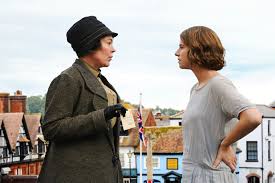Movie Info
Movie Info
- Director
- Thea Sharrock
- Run Time
- 1 hour and 40 minutes
- Rating
- R
VP Content Ratings
- Violence
- 1/10
- Language
- 6/10
- Sex & Nudity
- 1/10
- Star Rating
Relevant Quotes
If any think they are religious and do not bridle their tongues but deceive their hearts, their religion is worthless.

James in his letter could be describing Rose (Jessie Buckley) in director Thea Sharrock and writer Jonny Sweet’s wicked little movie, set in the town of Littlehampton, England, back in the 1920s. However, another citizen excedes her in vituperation, but not by words spoken aloud—instead, in “wicked little letters,” mailed to various citizens. The film becomes a who-done- it period piece and study of character and class, ending a court drama that is fun to watch.
God-fearing Edith Swan (Olivia Colman), a spinster living with her mother Victoria (Gemma Jones) and father Edward (Timothy Spall), is the first to receive a number of such short notes. Constables Spadding (Paul Chahidi) and Papperwick (Hugh Skinner) immediately suspect the foul tongued Rose Gooding (Jessie Buckley) because of the fact that she is Edith’s next-door neighbor and her flow of insulting words, chief among which is the “F-word,” are daily aimed at whoever raises her ire. There might also be a touch of prejudice in their act because the woman is an Irish immigrant, raising her young daughter with a live-in Black boyfriend. (We must remember the time period when the Irish uprising was just a recent time in the past.)
Edith convinces the press that she has forgiven her verbal assailant, piously stating, “By my suffering, do I not move closer to heaven?” This martyr’s attitude proves popular with the usually cynical press. Rose, in her own defense, asks why she would risk her freedom when she has a young daughter at home. To Edith she declares that she is innocent and would not risk losing her daughter.
The third member of the local constabulary, “Woman Police Officer” Gladys Ross (Anjana Vasan), does not agree with her superiors’ assessment. Each time she raises a doubt about Rose’s guilt, Spadding orders her to stop, that under no circumstance should she try to investigate the case. Fortunately for Rose, Constable Ross is not one to give up so easily, even when ordered to—in one of the funniest scenes in the film, she can no longer stand the smug stupidity and sexism of her two dunderhead colleagues, so she rushes from their presence into an adjoining stairwell to let out her frustration in a primal, but silent scream. On the left side of the screen, we can see her idiot colleagues, and on the left, she is threshing her fists about and stamping her feet, her mouth wide open, but issuing no sound.
Even when she is sacked because of her persistence, she does not give up. Ross comes up with a plan to catch the real culprit in the act that involves some other ladies, the post mistress, and even Rose’s daughter Nancy (Alisha Weir). When the letter writer is at last caught, there is a touch of feminist rage and a meeting of minds between Rose and the culprit that is sort of a reconciliation that leaves one feeling good about the outcome. To watch Edith’s tyrannical father get his comeuppance is great fun.
The filmmakers claim that their script is “truer than you’d think” adds to the good feeling. Also, the sense of inclusion fostered by the color-blind casting is enjoyable. It does stretch credibility that Rose should be living with a man of color Bill (Malachi Kirby) without the white neighborhood up in arms, that the trial judge and the postmistress should also be of African background during that era, and best of all, that Constable Ross should be of South Asian descent (this at a time when Gandhi was made well aware of his inferiority by the colonial oppressors), but…Indeed, by her smarts and persistence, Anjana Vasan’s “Woman Officer” Ross becomes the real heroine of this droll tale. (I place “ “ around her title because that is the way she is usually referred to in the film, one more touch of humor.)
The scatological language of both the “wicked little letters” and of Rose’s unbridled tongue make this (delightfully) wicked little film a dubious choice for a youth, or religious group of any age, but I still commend it for its many virtues. If you are able to laugh, not despite, but in many scenes because of the language, this film might become a tonic when life seems to be too serious to endure.
This review will be in the May issue of VP along with a set of questions for reflection and/or discussion. If you have found reviews on this site helpful, please consider purchasing a subscription or individual issue in The Store.
